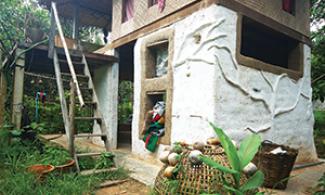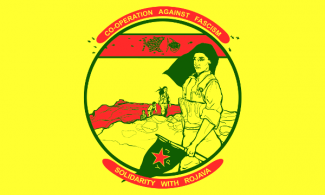
Dr. Isabel Uribe
Ever since I first learned about Mondragon cooperatives in Dr. Christina Clamp's graduate class at Southern New Hampshire University, I have been fascinated with what black people might do with the lessons from the Mondragon experience.
I was intrigued that Father Jose Arizmendiarrieta started the first school in response to the Spanish government prohibiting the Basque people from speaking their native language. (The Basque are an ethnic group in northern Spain and France.) That "nationalist" spirit eventually led to the formation of many more cooperatives (120 today), including a credit union, so that the Basque people could be a self-determining people. (I call it nationalism, but perhaps that is not the best word - I mean self-love, love of their culture and society, independence and self-determination.)
While the current situation of black people in the U.S. is much more complex, there is a similarity in the attempt at cultural annihilation and the need for self-determination. The enslavement of African people and their settlement in the U.S. and other parts of North America resulted in the annihilation of the languages (from many different countries and ethnic groups), families and communities among those captured and enslaved. Worse - and more long-lasting - was the brutal physical terrorization and mind destruction that, along with continual racism, affects our ability today to recover in an economic system that sucks our life-blood and blames us for our "failures" while making others rich.
The Mondragon response was an answer, I believe, for African people in the U.S. who suffer disproportionate unemployment and underemployment, alienation, apathy, destruction of family and social support, and self-hatred nurtured by racism. It is not as if cooperatives are foreign to us. Dr. Jessica Gordon Nembhard, who just finished a soon-to-published book on black cooperatives in the U.S., said in a personal conversation, that her research revealed that the entire history of the black struggle for survival can be rewritten to reflect that cooperatives were a major component.
Forming more worker cooperatives could be a way to bring back self-respect, self-help and self-determination, while helping to solve the problems that beset black people as a result of centuries of economic bloodsucking and the concomitant brainwashing and internalized racism, and terrorist attacks such as, COINTELPRO, and who knows what the present-day iteration is, to support it.
So my coming to Mondragon as part of this study tour was to learn what Mondragon was doing that could help black and other poor and disenfranchised people to lift ourselves up from our current sad situation.
We were able tour a display of Saiolan's products
On Wednesday, when I learned about the Saiolan story, I got really excited. This is just the kind of process needed to help aid the natural (yet suppressed) creative genius of black people (just research the inventions by black people, including those appropriated by the "slavemasters,") and, of course, other people in the U.S. - particularly the working class, women and others who are inculcated that running businesses is the purview of a privileged few. Or those who see no way to raise the money to turn their idea into a product or service. Or those who do not have the wherewithal to find the support they need to make their ideas materialize.
There are so many people who have great ideas for businesses, but either lack the self-confidence, boldness, support of friends and family, not to mention funding capability to support their genius. A Saiolan or Saiolan-type organization in the U.S. could go a long-way to help change the world by nurturing would-be entrepreneurs, creating jobs and other "possibilities."
Dr. Isabel Uribe, a Basque Mexican-American, said that Saiolan founders asked the question:
How can a person with the potential to become an entrepreneur, regardless of his or her training, professional qualities, age, or economic resources create his or her own business?
There was a real need driving this question.
In the 1980s, Uribe said that up to 60% of students graduating from universities in the Basque County, where Mondragon is located, were unemployed.
The Basque County is a region in northern Spain and France consisting of seven autonomous provinces. The Basque people formed their first cooperatives after the Spanish government outlawed the speaking of their language in the late 1940s. The Catholic Priest Jose Maria Arizmendiarrieta set up the first Basque language school and later a vocational school to create jobs for the Basque people. This led to the formation of Fagor cooperative, Mondragon's first, with five students from the school. From that first co-op Mondragon now has 120 cooperatives, including a credit union to help finance their funding.
Saiolan's mission was to create jobs, which means they didn't care whether you became a sole proprietor, or a co-op. "Our main goal is the generation of employment through the development of business products," Uribe said.
"Lan" means work in Basque, so Saiolan means "try to work" or "experience work. " The company was started by a couple of professors who worked for eight hours a day from "dedication," said Uribe. "It was a very humble origin."
Though initiated by Mondrogan, Saiolan is not a cooperative. As a for-profit co-op, it could not receive funding from the Basque government, which contributes loans and grants for the program.

Four elements are part of what Saiolan offers:
1. Person-led training;
2. Evaluation of the business idea. "Not every idea is a business opportunity," Uribe said.
3. Study and experience;
4. Financial resources and coaching. "Sometimes coaching is more important than financial elements, " she noted.
Here is how the program works.
An individual can approach Saiolan with an idea for a business or a product. The idea is evaluated, and if found to be viable, they start working on the project doing research. "They should be here working 8 hours on it," Uribe said. "They have a space to work and coaching so that they can start."
The individual decides what kind of company they want to create, whether a private one or a cooperative, or some other form. Before, like in D.C., five people were needed to form a co-op, but now it is only two. They can get government funding, but in the meantime, Sailoan may give them a grant.
Help in the form of personal coaching, business plan development, training and money will be offered. The support system looks at the project from many angles and driving forces, such as family, environment, government, and enterprise coaching.
A prototype or experimental model is first created. "Every model has to be adapted and adopted to its reality, not just on paper," Uribe said.
Uribe gives an example. A young engineer was unhappy with his job. He took a leave of absence and came to Saiolan with an idea for bars and restaurants to sell food. He believed that if a bar had a kitchen, it could sell what the Basque call pintxos, or small plates or "pinches" of food. They are also known as "tapas" in Spanish, and what we know in the U.S., though my experience with tapas in the restaurants in the DC area, can't hold a candle to the pintxos I saw in Mondragon and San Sebastian.

Pintxos at a bar in San Sebastian

The would-be entrepreneur made pintxos (pronounced like "pinch-chos") for the Saiolan staff to critique. His dream was to go to San Sebastian, about an hour away, which is internationally recognized for its food. His problem was finding a commercial kitchen. Saiolan helped him to find a school on the coast with a commercial kitchen and he was able work for a month in August while school was out. But this process of working on a prototype revealed a problem he had not foreseen in his business model.
"He had never imagined how difficult it would be to find a cook," Uribe said. "This was something it was better to find out before he started his business." In the end he found a woman who needed to work, and he trained her because he couldn't find a chef at a culinary school. Now the engineer-turned entrepreneur is successfully selling pintxos, and is much happier.

Breakfast pintxos at Hotel Mondragon where we stayed.
Another interesting project was the establishment of a domestic oil collection system in Mondragon/Arrasate. Eko3r is a mixed cooperative which household cooking oil is in big green boxes in the municipality as a way to prevent pollution of water as well as to be turned into bio-fuel. Companies and the municipality of Mondragon are part of the cooperative. The municipality gives each household a container to collect their oil. Doing so helps prevent pollution.
For every liter of oil disposed of improperly by say, throwing in on the ground or dumping it in the trash which leads to ground contamination, 1,000 liters of water is contaminated. Householders take their individual containers to the big box, deposit it, and are given a new container to take home. Sixty four green containers are in Mondragon/Arrasate serving 25,000 people. Uribe did not know how much had actually been turned into bio-fuel. The oil can also be used to make soap, she said.

I didn't notice any of the green containers in Mondragon, but saw them
in Bilbao (about an hour away), where the idea has also spread. They are alongside containers
glass and other recyclables.
The idea turned on people in the group. "That's a great idea," someone in our group remarked. Chris Clamp talked about how a group in Boston was collecting oil from commercial kitchens and turning it into bio-fuel.
Saiolan has grown from an emphasis on individuals to business coaching for companies wanting to create products.
"In the beginning our main clients were entrepreneurs, nowadays it's companies," Uribe said. "That has been our evolution."
Four main areas comprise their work: developing products and services in water, micro-manufacturing, smart packaging and quality of life. The staff has developed an International Antenna, by traveling to different countries to identify ideas and areas to build relationships. Sometimes they do an Immersion, a longer visit establishing relationships and becoming a bridge.
"We believe we must be open," Uribe said. "We must build relationships to have different experiences."
Uribe reported that since 1985 Saiolan has created 172 businesses or products. Of that number 80%, or 138 business are currently in operation. Thirteen percent of the businesses failed before the first year and 12 or 7% closed after more than five years. As a result of Saiolan's work 2,281 people have jobs. Impressive.
Here again, Arizmendiarrieta's vision is at work: Just as he encouraged Mondragon's first school and co-op to send engineering students abroad to learn from the world's engineering schools and to bring that knowledge back to the Basque country so that they could be competitive, Saiolan puts out its international antenna seeking innovation and new prospects for products, job and partnerships.
As the information soaks in, I was starting to get the picture. The Basque people are very proactive in their approach to self-determination. And they use all means to create jobs for their people: helping to create all kinds of businesses and enlisting the help of the Spanish government, which is now much more supportive of the Basque people, and the Basque country. Much of this, I'm sure, is due to the Mondragon Cooperative Corporation's success and economic impact on the country.
I am appreciating MCC more and more each day.

Pintxos and tapas recipe books on sale at the Bilbao airport.
They are a big part of the culture in Spain. Most of them were
made with meat, cheese and seafood, so this "loca Americana" vegan didn't get
to experience them.



Add new comment